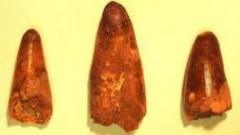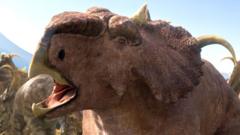On January 28, 2023, French customs officers conducting a standard check on a Spanish lorry near the Italian border stumbled upon an intriguing discovery – nine dinosaur teeth believed to be over 66 million years old. The incident occurred on the A8 motorway, where the officers were inspecting parcels when they found the fossils, prompting further analysis by experts at a local prehistory museum.
French Customs Intercept Nine Dinosaur Teeth in Unusual Find

French Customs Intercept Nine Dinosaur Teeth in Unusual Find
French customs officials discover nine ancient reptile teeth during a routine vehicle inspection.
The teeth have been traced back to reptiles that existed during the Late Cretaceous period, specifically from Morocco. Among the notable finds were three teeth belonging to a Mosasaurus, a large marine reptile, known to have measured up to 12 meters, and a tooth from a Zarafasaura oceanis, which itself was about 3 meters long. Additionally, five teeth were identified as belonging to a Dyrosaurus phosphaticus, an ancestor of modern crocodiles.
The lorry driver, whose identity has not been disclosed, said the parcels were destined for recipients in Italy, specifically in the cities of Genoa and Milan. French customs officials are currently investigating to identify these intended recipients. Although collecting fossils can be legal, their exportation without the necessary licenses is typically against the law.
French customs, in light of their routine practice of inspecting vehicles, indicated that their main focus during stops is often on preventing drug trafficking; however, they were taken by surprise by this unique find. The authorities continue to remind fossil collectors about the legal implications of exporting such items.
In summary, this unusual discovery highlights the hidden treasures and complexities of fossil collection and export regulation, blending paleontological interest with legal oversight on international borders.
The lorry driver, whose identity has not been disclosed, said the parcels were destined for recipients in Italy, specifically in the cities of Genoa and Milan. French customs officials are currently investigating to identify these intended recipients. Although collecting fossils can be legal, their exportation without the necessary licenses is typically against the law.
French customs, in light of their routine practice of inspecting vehicles, indicated that their main focus during stops is often on preventing drug trafficking; however, they were taken by surprise by this unique find. The authorities continue to remind fossil collectors about the legal implications of exporting such items.
In summary, this unusual discovery highlights the hidden treasures and complexities of fossil collection and export regulation, blending paleontological interest with legal oversight on international borders.





















